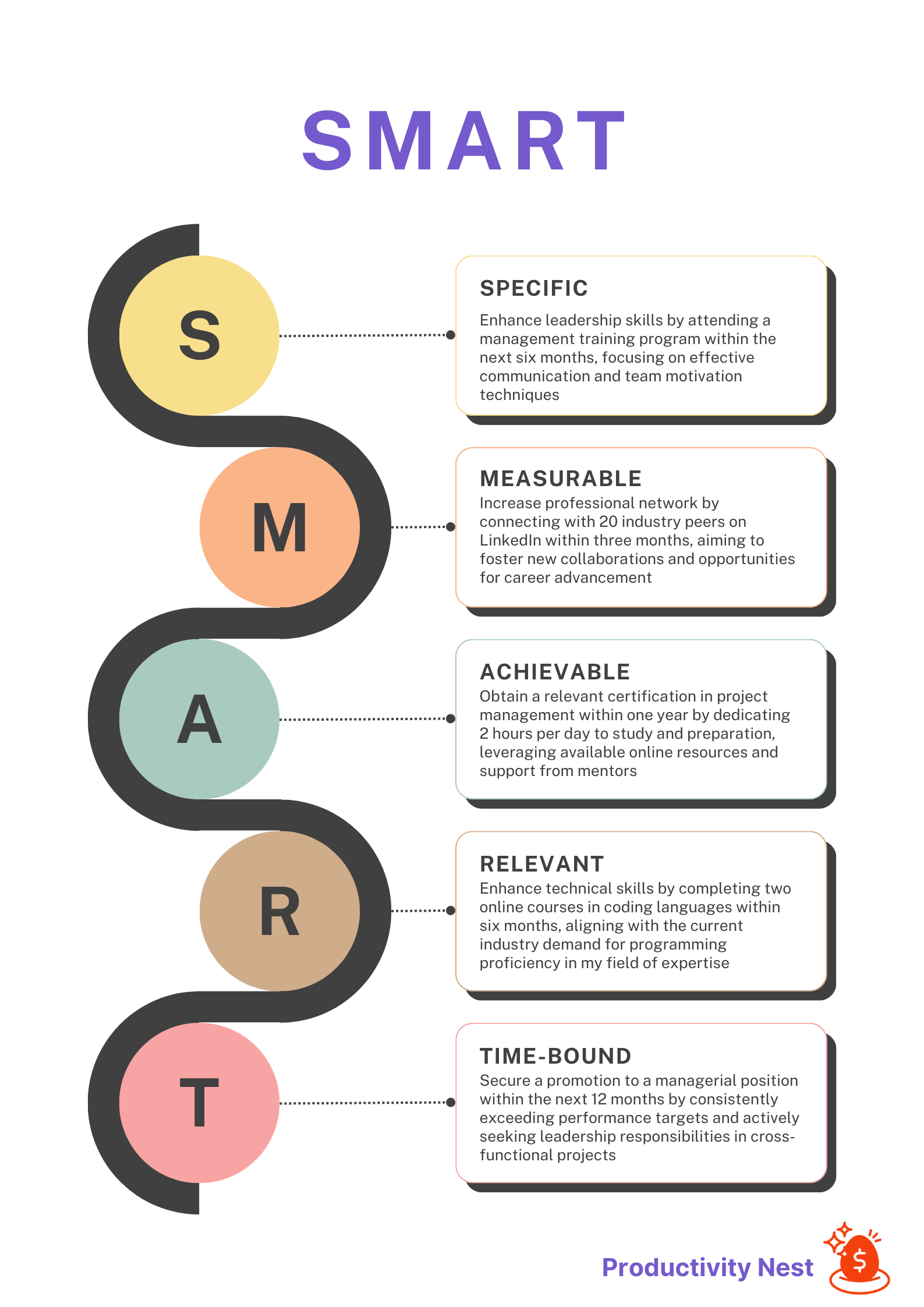Career development is an ongoing process that involves identifying your skills, interests, and goals, and taking steps to achieve them. Enhance your career development and it can lead to greater job satisfaction, increased salaries, and more opportunities. Whether you are starting your career or looking to make a change, there are several steps you can take to optimize for success.
Let’s dive in!
Identifying Career Goals
Identifying career goals is an important first step. By setting goals, you can focus on your career direction and determine the steps needed to make it a reality. Let’s look at how can you do this:
Setting SMART Objectives
One way to identify career goals is by setting SMART objectives. SMART stands for Specific, Measurable, Achievable, Relevant, and Time-Bound.

For example, someone who wants to become a project manager can set a SMART objective of completing a certification course within six months. This goal provides a target and a deadline, moving you toward your overall goal of becoming a project manager.
Understanding Industry Trends
Another way to identify career goals is by understanding industry trends. Researching industry trends helps to identify skills that are currently in demand.
Say you want to become a ‘content marketer’, trends are pointing towards AI-driven content creation. Set learning goals around these trending skills and it will help you progress.
Building Professional Skills
In today’s ever-changing job market, it is essential to develop and refine your skills to advance your career. You can build skills through various means, including online courses, workshops, and on-the-job training.
Online Courses and Workshops
Online courses and workshops offer a flexible and convenient way to enhance professional skills. They allow you to learn at your own pace. You can find online courses and workshops through lots of reputable companies that cover a wide range of topics. Learn technical skills like programming and data analysis to soft skills like communication and leadership.
On-the-Job Training
On-the-job training is an effective way to develop while gaining valuable work experience. It allows you to learn new skills and techniques and apply them in real-world situations. This helps to reinforce what you are learning and aids learning retention.
Networking and Relationships
Fostering relationships is essential to enhance your career development. Networking is about meeting new people and growing relationships with professionals who can offer support, guidance, and opportunities. Here are some effective ways to network and build relationships:
Attending Industry Events
Conferences, trade shows, and seminars are a great way to meet people in your field and expand your network. These events provide an opportunity to learn about the latest trends and developments in your industry. They will also allow you to connect with other professionals who share your interests, and who you can learn from.
Using Social Media
Social media platforms such as LinkedIn, Twitter/X, and Facebook are powerful tools for networking and building relationships. LinkedIn, in particular, is a great platform for you to showcase your skills and experience, connect with others in your field, and find job opportunities.
Mentorship Opportunities
Mentorship is a valuable way to build solid relationships and gain guidance in your career. Mentors can offer advice, share their experiences, and provide growth opportunities. Look for mentorship programs in your industry or seek out professionals who you admire and respect.
Personal Branding
Personal branding is a key aspect of career development in the digital age. It gives you the chance to market yourself effectively. It involves creating a unique identity that sets you apart from others in the industry. A strong personal brand can help you establish credibility and advance your career. Here are some ways to enhance personal branding:
Online Presence
Having a strong online presence is crucial to enhance your career development in today’s digital age. Social media platforms like LinkedIn, Twitter/X, and Instagram can be used to showcase your skills, experience, and achievements. It’s important to keep your profile up-to-date and engage with others in your field, or that align with your skill interests.
Public Speaking
Public speaking is a great way to showcase your expertise. Speaking at industry events, conferences, and webinars can help you build confidence and establish yourself as a thought leader. It’s important to prepare well in advance, tailor the presentation to the audience, and practice delivery. Public speaking can also help you build a network and establish relationships with others.
Content Creation
Content creation is another way to showcase your expertise and build a reputation within your field. Tying in with building your online presence, you can create blog posts, videos, or record podcasts. Use platforms such as Linkedin and Twitter/X and tailor your content to the target audience you are trying to reach. Consistency is key when it comes to content creation, and it’s important to post regularly (3-5 times a week) to maintain engagement.
By focusing on personal branding, you can enhance career development and establish yourself as an expert. Building a strong personal brand takes time and effort, but the benefits can be rewarding. By creating a unique identity, showcasing expertise, and building a community, you can advance your career at a faster rate.
Work-Life Balance
Maintaining a healthy work-life balance has to be one of my top tips for career development. It helps you manage your personal and professional life effectively, leading to better productivity and job satisfaction. Here are some tips:
Time Management
Time management is fundamental. It helps you to focus on tasks and divide up time accordingly. Here are some ways I like to organize my time:
- Create a Schedule: Creating a schedule helps you to allocate time for important tasks. There are various methods and ways to do this (look out for another post on this), but the most simple way is to utilize your favorite calendar tool and block out time for your tasks.
- Avoid Procrastination: Easier said than done, but procrastination can lead to stress and anxiety. Try to complete your tasks on time to avoid last-minute stress (the schedule will help this).
- Take Breaks: Taking breaks at work can help recharge and increase productivity. Get away from your screen, get some fresh air, and recharge your batteries.
Stress Management
Stress is a common problem that can impact your professional life. It can lead to burnout and affect well-being. Here are some stress management tips:
- Exercise: Exercise is an effective stress reliever. Even a 10-minute walk every day can help reduce stress and improve your mental and physical health.
- Meditation: Meditation is a proven stress management technique. It helps to calm your mind and reduce stress.
- Set Realistic Goals: Setting realistic goals will help reduce stress as you won’t be putting unrealistic pressure on yourself.
Start slowly and install these tips into your daily routine. You’ll begin to see the benefits of enhancing your work-life balance, leading to better career development and overall well-being

This is some awesome thinking. Would you be interested to learn more? Come to see my website at QU5 for content about Thai-Massage.
Hey there, I appreciate you posting great content covering that topic with full attention to details and providing updated data. I believe it is my turn to give back, check out my website Article World for additional resources about SEO.
Thank you for sharing your precious knowledge. Just the right information I needed. By the way, check out my website at YV6 about Web Traffic.
This was a very good post. Check out my web page ZQ3 for additional views concerning about Thai-Massage.
Great job site admin! You have made it look so easy talking about that topic, providing your readers some vital information. I would love to see more helpful articles like this, so please keep posting! I also have great posts about Airport Transfer, check out my weblog at YH9
This was a very good post. Check out my web page UY7 for additional views concerning about Thai-Massage.
Informative articles, excellent work site admin! If you’d like more information about Airport Transfer, drop by my site at UY6 Cheers to creating useful content on the web!
An excellent read that will keep readers – particularly me – coming back for more! Also, I’d genuinely appreciate if you check my website YR4 about Web Development. Thank you and best of luck!
open account binance – create binance account
Crie uma conta Binance – criar conta binance
create binance account open account binance
Erstellen Sie ein Binance-Konto Kostenloses Konto erstellen Binance